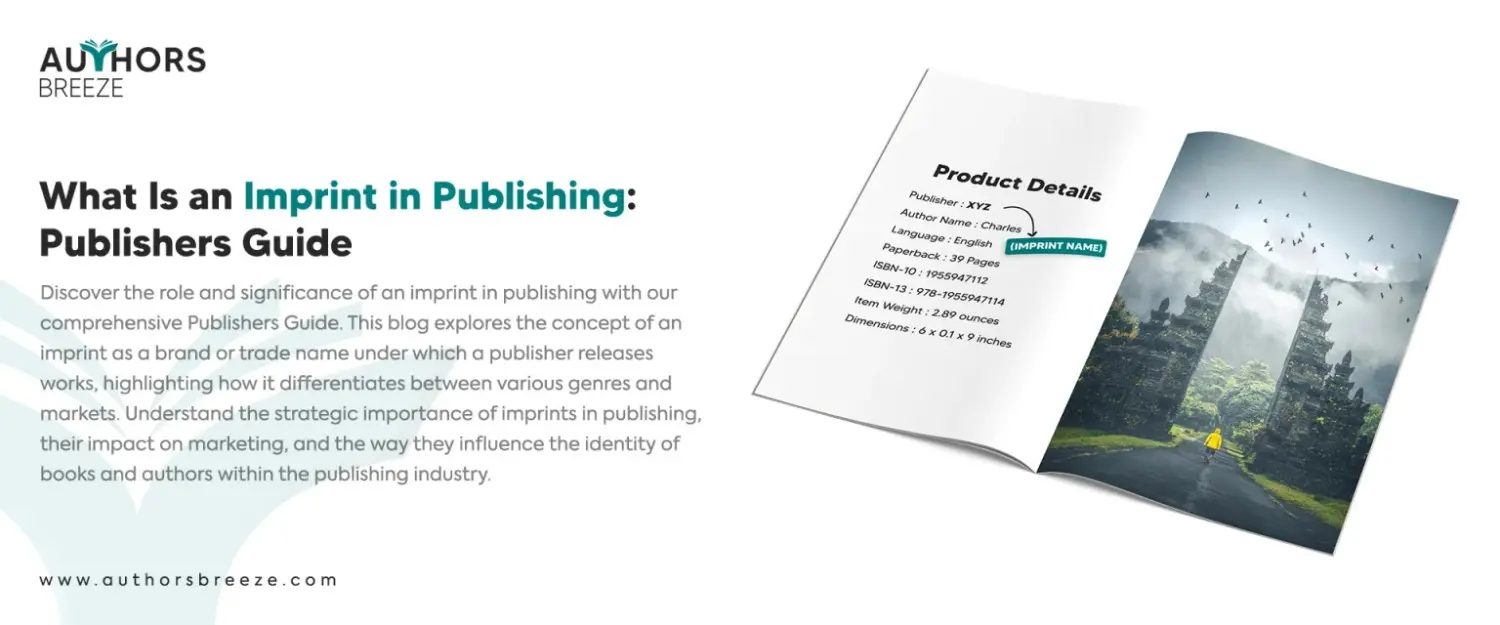Don’t Have Time to Read? Listen to this Article Instead!
Key Takeaways:
- An imprint in publishing is a specialized brand within a large publishing house designed to cater to specific genres or reader interests that make it easier for books to reach their intended audience.
- Imprints are crucial for authors looking to publish traditionally, as they help them target the right division within a publishing house that aligns with their book’s genre and audience.
- For self-publishing authors, creating an imprint can help organize different genres or types of stories they write, enhancing their brand identity and making their work more discoverable to readers.
- Imprints provide authors with specialized marketing, editorial support, and a boost in credibility, facilitating a better match between books and their potential readers.
An imprint in publishing is a particular brand name an extensive book publishing company uses to put out books. It is kind of like a team inside a big company that takes care of publishing certain types of books.
Something many people want to do is to write a book. However, actually finishing one shows real dedication. So, you have just finished writing your book. Now, you are thinking about how to publish a book in the traditional way. You may wonder about the difference between a publisher and an imprint.
Take the Big 5 publishers in New York:
- Penguin Random House
- HarperCollins
- Hachette Book Group
- Macmillan
- Simon & Schuster
They all have smaller teams called imprints. For example, Del Rey is a team that publishes sci-fi and fantasy books under Penguin Random House. Harper Business does business books. However, it is part of HarperCollins.
So, when you publish your book, you should know about imprints. It can help you understand who might be interested in your book and how the publishing world is organized.
What is an Imprint in Publishing?
So, what is a publishing imprint? A publisher’s imprint is a unique brand name it uses to publish books. Suppose a big book company has several smaller brands under it. Each of these is called an imprint. These imprints are used to target different types of readers with specific interests. A big company might sometimes create these imprints by buying smaller book companies. Then, they use those names to reach particular groups of book lovers. Each imprint in publishing has its own style or goal that makes it easier for readers to find books they like.
How to Set Up Imprint in Publishing?
Suppose you’re a writer who enjoys writing different types of stories, and you publish your books on your own. In that case, you might want to think about making separate labels or brands for every kind of book you create. Here’s a simple guide to creating an imprint in publishing:
Define Your Purpose
Think about what you want your imprint to stand for. Do you want to publish mystery stories or perhaps focus on stories with strong female characters? Your mission will help shape your imprint’s identity.
Choose a Name
Pick a catchy and relevant name for your imprint. It could be related to the type of books you write or something unique to you as an author. For instance, if you write cozy mysteries, you might choose a name like “Cozy Whodunit Press.” Another good option can be your pen name for your imprint.
Create a Logo
Design a simple logo that represents your imprint. It doesn’t have to be fancy; a unique letter or symbol can work. You can try creating one yourself using user-friendly tools such as Canva or hire a designer if you prefer.
Build a Web Presence
Make it easy for readers to find information about your imprint in publishing and its mission. You can create a separate website for your imprint or add a dedicated page to your author website.
Promote Your Imprint
Whenever you release a book, make sure to include your imprint’s name in your marketing materials. For example, “Discover the latest adventure from Cozy Whodunit Press.” As you publish more titles, you can promote your imprint as a brand, attracting readers who enjoy your specific genre or style.
Expand Your Reach
If you have the opportunity, consider publishing books by other authors under your imprint. This can help your brand grow and benefit other writers by giving them access to your established brand name.
Publish Your Book Today!
Done writing your book and your book imprint! It’s time to showcase your book to the readers. Contact us to publish your literary work!
What are the Benefits of an Imprint in Publishing?
Imprints help a publisher for a book build notable brand names that make it easier to reach the right readers. Authors can enjoy several advantages by publishing a book under a certain imprint. These include specialized book marketing that speaks directly to their ideal audience, advice from experts who know their genre well, a boost in how trustworthy they appear, and access to tools and help they might not have on their own.
When authors choose an imprint in publishing that fits their book’s style and goals, they can make their book stand out more in the crowded world of publishing. This way, both the author and the publisher can work together more effectively to make the book a success.
FAQs
Why do publishers have imprints?
Publishers use imprints for branding and marketing. Imprints act as a branding strategy for publishing companies. They make it easier for them to promote and sell their books. A famous and trustworthy imprint can draw in authors, literary agents, and readers who recognize and have confidence in the brand. This way, publishers can better position their books in the market by appealing to specific audiences who are already interested in what the imprint in publishing is known for.
What is an imprint page in publishing?
The Imprint Page is found right behind the Title Page of a book and provides all the key details about the book. It tells us who wrote the book, the publishing company, how to contact them, where the book was printed, the book's ISBN (International Standard Book Number), and other relevant info. This page is a one-stop source for all the critical facts about the book's publication.What does it mean to make an imprint?
The word "imprint" means to leave a mark or stamp on something, such as putting a publisher's name on a book. But it's not just about physical marks; "imprint" can also describe leaving a lasting effect or influence on someone or something. Whether used as a verb ("to imprint") or a noun ("an imprint"), it's versatile. You could physically press a stamp with your initials onto a piece of paper, creating an imprint, or you might leave a more profound, symbolic imprint on someone's life through your actions or words.
Who are the Big 5 Publishers?
Five dominant publishing companies that control a large portion of the market are:
- Penguin Random House
Hachette - HarperCollins
- Macmillan
- Simon & Schuster
Conclusion
An imprint in publishing is crucial for authors of the publishing world, especially when they consider traditional publishing methods. Imprints serve as specialized brands within larger publishing houses, each with its own focus and audience. This structure allows publishers to cater to specific genres and reader interests more effectively.
It provides authors with a targeted book marketing plan and editorial support. No matter if you are a first-time author or an experienced writer and you want to publish your book, you should know the value of imprints. It can help you find the right home for your work. So, align with an imprint in publishing that resonates with your book’s genre and target audience. As a result, you can enhance your chances of success in the competitive publishing world.
Promote Your Book Effectively
Not just imprints, we, too, help you market your book. Get our services and make the most of your marketing efforts.






